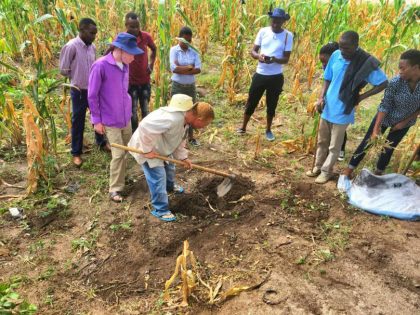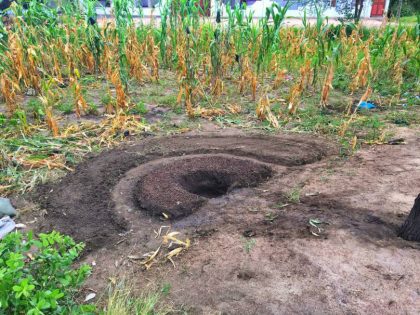All 3 of these Perma garden training projects have been completed under the direction of Peter Jensen. To read about the start of the project, CLICK HERE.
The project was designed to train people with albinism and people with HIV in the construction and maintenance of permaculture type agricultural practices so that they can manage their water and organic waste resources, and produce more food for less effort. This effort has been very successful, and now they will be training hundreds of other families to do the same over the coming year. Water Charity is thrilled to be able to have such a direct and fundamental impact on these communities, which are among the most at risk anywhere on the planet. See our People With Albinism Program and our Permagarden Training Initiative for more details, as this effort falls under both larger efforts.
Mhunze and Shinyanga Albino Groups Permagarden Training
Peter reports:
People living with Albinism face food, water and income security challenges just as do those without Albinism. The need for sustainable food is felt by all in this part of the world. But those with Albinism do face greater challenges due to their physical but also their stigmatization and insecurity within traditional rural society. These conditions cannot be changed but they can be mitigated by the close to the home and high yield benefits of the Terra Firma method. This high-yield, water- conserving Permagardens are ultimately created close to the security of home but which as each of the groups discovered, can be used as a road map for the way forward for watershed management and even ecosystem restoration. Under the direction of Mr. Kenedy Mahili and his team at CLAO (Community Life Amelioration Organization) based in Mwanza, Tanzania, two 3-Day Intensive Terra Firma Permagarden Trainings were delivered by Peter Jensen, Agro ecology and Permagarden Training Specialist from Terra Firma International (RPCV Haiti, 85-87).
Permagardens are all about the water! By bringing runoff under control in small spaces close to home, the soil climate is altered allowing year-round production if the garden is properly intercropped and harvested. This subsoil moisture recharge makes these gardens climate-smart, nutrition-focused and high-yield. Since only locally accessible organic wastes and local tools and seeds are used, these gardens cost next to nothing to create. Removing this cost barrier is huge in food insecure households. Quick results and low cost will mean rapid expansion from neighbor to neighbor.
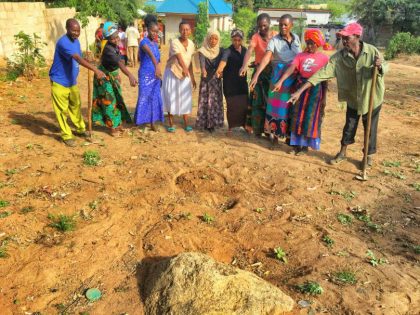
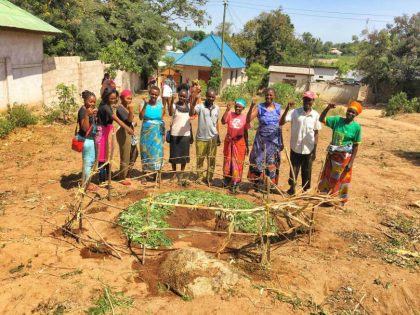
These two trainings (only with that provided to the Adult PLWHA Group in Mwanza) were funded by Water Charity in support of Friendly Water for the World. Along with the CLAO staff, there were 25 Secondary Boarding School Boys in the first training (later joined by 75 other boys from the school who were simply too eager to be denied) and 25 adults in the later training. Each garden creation and management training was held over 3 consecutive days from 9am to 1 pm with later afternoons devoted to staff discussions and outreach planning.
CLAO Staff who were trained in Keyhole Design and Outreach were: Kenedy Mahili, Emanuel Ngoko, Happiness Charali, Musana Joseph, Naomi Melk, Tina Melk, Mariam Abubakari, and Dina Okech. This outreach team gained significant new skills in garden design and management as well as training facilitation with both teens and adults.
The Terra Firma Method guides learners to make sound agro ecological decisions that will benefit themselves as well as the ecosystem. Assessing everything that they have rather than worrying about the things they think they need guides the gardener how to start from a position of strength, “I have everything I need to get started!” This is an extremely powerful and important first step that inspires the next steps of capturing, protecting and producing with those already accessible materials. The final step which actually weaves itself through each of the first 4, management, allows for the daily harvest of nutrient-dense grains, legumes and vegetables.
Thanks to Water Charity, this Friendly Water for the World staff and small groups they support will be spreading the Terra Firma method within the rural and peri-urban areas of Mwanza and Shinyanga. By learning to wisely manage their water and organic waste resources they will now be training hundreds of other families to do the same over the coming year. This is a long-term solution to acute hunger and chronic food and ecosystem insecurity. Getting water from Terra Firma Permagardens is perfectly compatible with the drinking water from the fantastic Bio-Sand Water Filter Programs of Friendly Water for the World.
Before and After Pictures:
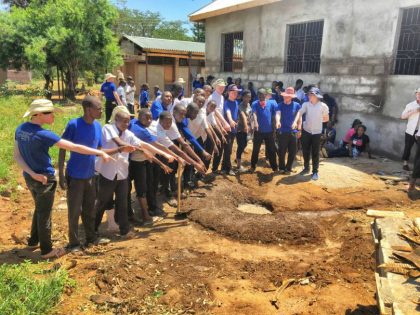
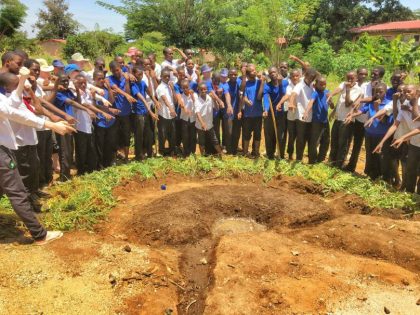
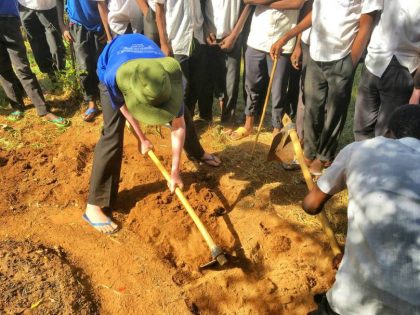
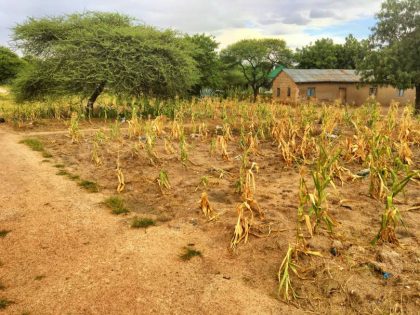
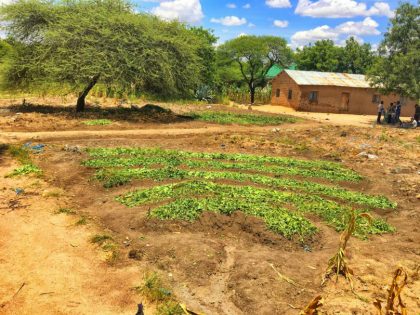
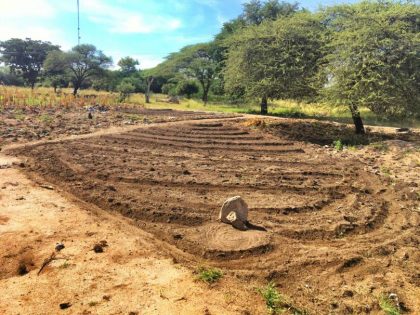
Over the coming months, the rains will continue to fall across Northern Tanzania. The small initial gardens created by the training participants at their own homes will lead to widespread adoption from neighbor to neighbor once the extended harvest and double cropping opportunities are seen and fully appreciated by those initially reluctant observers. CLAO staff will visit families and report back on the uptake. It is through this small doable action that positive attitude change and eventual behavior change becomes a reality. While any change is slow to spread at first, this method has the chance to go very far across these challenging environments simply because they require only carefully assessment, capture and wise use of the already existing organic assets, rain, sun, and soil. We cannot change the climate above our heads but we can take direct action to change the climate below our feet; and live abundantly and healthfully as a result.
Terra Firma Permagarden Training Report CLAO Mwanza
Peter Reports:
Terra Firma Permagarden Training Report CLAO Mwanza In collaboration with Friendly Water for the World and CLAO, under the direction of Mr. Kenedy Mahili, a 3-day Intensive Terra Firma Permagarden training was conducted with 25 HIV affected individuals who are members of the Ilemela PLWHA Group, located in the outskirts of Mwanza Tanzania. Follow up within 3 months of training (by Mr. Kenedy Mahili and his staff) will be reported to show onward adoption of this simple yet empowering methodology. 60 home gardens are anticipated within this first period; benefiting 7 people per garden for an expected total of over 400 persons. A full year later this figure will be expected to be near 300, implicating an outreach to over 2000 women, children and men.
Daily access to nutrient-dense food and clean, safe drinking water is crucial to improving the quality of life of HIV infected persons as it is for all marginalized persons. One of the best ways to achieve both clean food and water within these marginalized households is to grow a variety of vegetables, grains and legumes within a home garden, especially during the long dry season. With the impacts of climate change now being widely felt, especially by the small holding poor, nutrition-focused gardens are also negatively affected during the normal rainy season. Irrigation would solve this problem; however, this is far beyond the reach of even medium-sized farmers let alone HIV-affected Small Holders. Without irrigation, many assume that a year round, daily-accessed, home garden is not possible. These families are extremely poor (most earning less than $1 a day) so any inputs must only be those which are already freely available on land which everyone can access on a daily basis. The need is for the knowledge and skills, not the materials, on how to bring these locally accessible organic materials to benefit the family.
The answer to this challenge and the perceived need of large land areas, new tools, and imported seeds and fertilizers is The Terra Firma Method. This method is a cross sectoral process which guides the learner to create a garden which uses only those currently accessible resources to improve soil health and capture as much rainwater runoff as possible. This runoff which had caused myriad collateral damages is forced into the subsoil, from whence it will return during periods of dry weather, whether it be the dry or wet season. This is known as Subsoil Moisture Recharge and can be extended from family to family with just a morning of work.
The step by step Terra Firma Method was used throughout to guide learners and future trainers how to make the most suitable all-organic, water-conserving, nutrition–focused, home garden for this particular climate and culture. Terra Firma guides the learner to make the best-informed, agro ecologically-appropriate garden but can also be used intersect orally in public health, youth development and small enterprise development situations as well. All actions within the workshop foster independence rather than dependency upon outsiders to continue. The “TF method” uses only the tools, plants and soil amendments that are already locally accessible to targeted beneficiaries, namely rural poor farmers, mothers and children enabling further adoption within the local community following training by these soon to be trainers. A simple 3mx5m roof in this part of Tanzania (1000 mm annual rainfall) will shed nearly 15,000 liters of water over the course of the rainy season. Without access to materials to build or buy a water storage tank, this water is mostly lost while causing erosion as it moves off the landscape. By assessing this slope and guiding the runoff into capturing ‘Keyhole Gardens’, this small area becomes an “eating water tank” by holding this copious moisture deep within the subsoil. Erosion is eliminated and the opportunity to grow a 365 day harvest becomes a sustainable possibility right outside the back door near the kitchen.
Before Images and After Images.
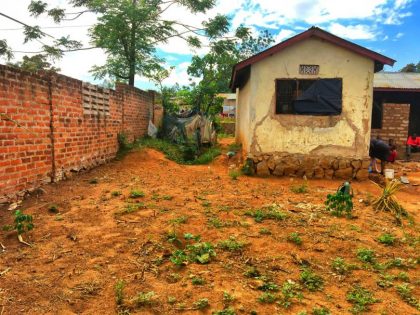
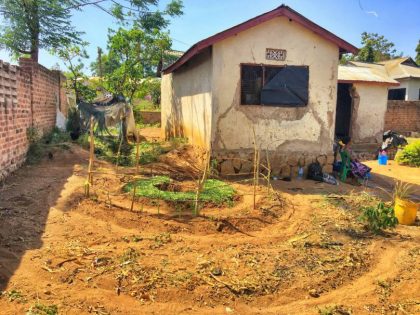
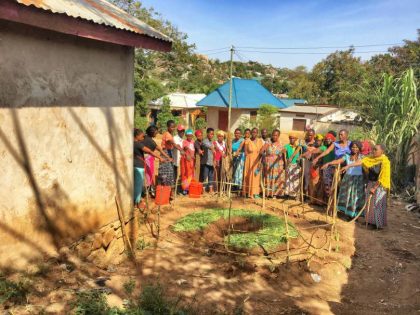
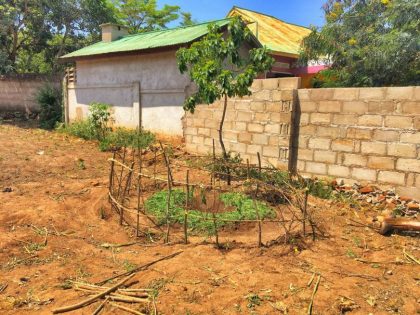
Follow up will be performed by local volunteers of CLAO and reported back to Terra Firma International for analysis and further guidance. The “bang for the buck” on these types of training is huge. We cannot even fully evaluate or document the full ripple effect it will have, as these techniques are spread and disseminated organically across the region. What we can say with certainty is that these communities will be better off from now onward and that many more people will be able to benefit from this.
Peter says:
A huge thank you to Water Charity for the financial support and Friendly Water for the World for the group formation assistance that has allowed this Terra Firma training to become a reality.
It was a great pleasure to provide this direct, hands-on learning experience and will enjoy being in touch with CLAO staff as they provide ongoing monitoring and evaluation.
We extend our thanks to Peter for completing this important project. Please consider donating to this effort so we can fund more projects of this type.
